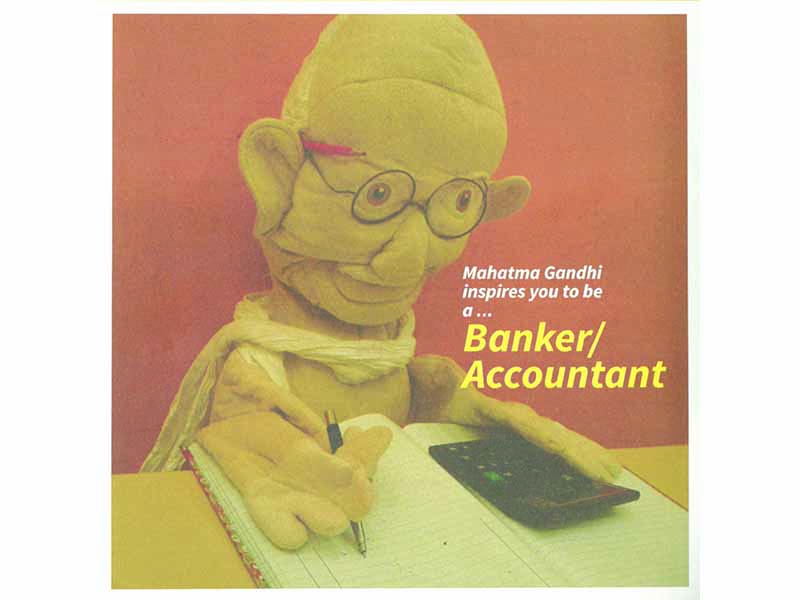When I grow up I want to be a banker/accountant just like the Mahatma…
 “Earth provides enough to satisfy every man’s needs, but not every man’s greed.”
“Earth provides enough to satisfy every man’s needs, but not every man’s greed.”
Did you know that…
Today we see Bapu’s face on many of our coins and all of our bank notes. Yet Mahatma Gandhi had very little money as a child
And that is why he realized the importance of money and taught people to use money wisely. Bapu believed that one should only spend money on the things that are needed. His ideas about simple living did not support the use of money for wasteful or extravagant items. He ate simple food, used cloth sparingly and did not spend on any luxury items.
Bapu taught children to spend money wisely and to make a habit of saving. He also exhorted everyone to maintain fair practices in transactions involving money. Every time we see his face on our coins or our bank notes, we should remember to use money prudently, respect it and save it.
Ask your parents to lend you some coins and currency notes for observation. Now look for the picture of Mahatma Gandhi:
- Is it similar on all the notes?
- Is his picture on the front and on the back?
- What about the currency of other countries? Whose face do they have on their currency notes and coins?
- You can also start a coin collection. Look at the coins with you. Are they all the same? Do they have a year printed on them?
- Try and collect coins in a piggy bank and then sort them based on similarities and differences.
Did you know that the Reserve Bank of India has a money museum? Ask your parents to take you there for a visit. Recently, the Reserve Bank of India has passed a directive that all currency notes that do not have a year printed on the back will be removed from circulation. Help your parents check the bottom centre on the back of each note, if it has a year printed on it, the note is of good use. If it does not have a year printed on it, ask your parents to return it to the bank.
Mahatma Gandhi wanted children to use money intelligently. Maybe today we can call this money intelligence. If you noticed, most crimes are committed for money. Most people believe that money puts you on the road to happiness, success and achievement. This is incorrect. We need to follow Mahatma Gandhi’s advice and learn to be wise and intelligent in the use of money. Mahatma Gandhi taught children to not judge others based on their wealth or lack of it.
Reflect upon the following questions, and think about how you can become money smart from today!
- What is money?
- What is it meant for?
- What are our ‘wants’ and what are our’needs?’
- Why save money?
- What are the different choices that we can make with money?
- How can we help others with money?
During festivals or on your birthday you will sometimes be gifted money by your elders. Wouldn’t it be wise to save some of that money in a piggy bank? Then you could become money-intelligent like Mahatma Gandhi.
You could grow up to be an accountant or a banker and choose money management as a career.
If you like the idea of becoming a money manager, here are some career options you might like:
Economist. An economist is an expert in economics. Economists often write about economic policy, and study, develop and apply economic theory. Their research might focus on topics such as energy costs, inflation, interest rates, farm prices, rents, imports or employment.
Mathematician. A mathematician is an expert in mathematics who solves mathematical problems. Mathematicians can be teachers, or work in the fields of astronomy or national security. Mathematicians are the reason we can send safe and secure emails, and buy things online.
Statistician. A statistician is an expert in the preparation and analysis of data. They often look for patterns in the data and try to explain the situation and give advice to their clients. Statisticians design and manage experiments and surveys and work in a range of sectors including market research and finance.
Day trader. A day trader is an individual who buys and sells assets such as stocks and currencies within the same trading day. Being good at math helps a trader recognize trends and probabilities of assets to make profits.

(Excerpted from Growing up with the Mahatma by Dr. Swati Popat Vats, Podar Publishing)






 “Earth provides enough to satisfy every man’s needs, but not every man’s greed.”
“Earth provides enough to satisfy every man’s needs, but not every man’s greed.”










Add comment